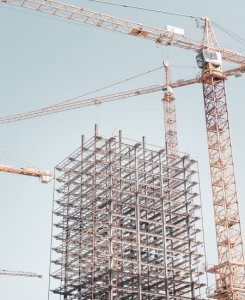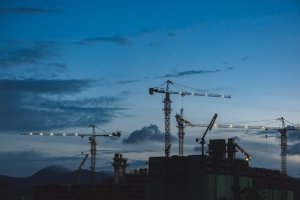- Construction

Shorter Reads
Coronavirus crisis: the legal impact on the construction industry
As cases of coronavirus (COVID-19) increase throughout Europe and the UK, the adverse impacts on the construction industry are becoming a reality. Industry clients and contractors need to consider both employment guidance and the impact delays may have on project completions.
2 minute read
Published 23 March 2020
Key information
- Services
- Construction
Employment issues
While it is important to discourage unauthorised absences, an employer’s primary duty in the event of a pandemic is to protect the health and safety of employees. This means ensuring good hygiene, good communication and that working practices don’t pose undue risks to staff.
Employees advised to self-isolate should continue to receive their usual pay.
Current guidelines state that if someone with coronavirus does come into work, it is not necessary to close the office or workspace. Local public health officials will, however, make contact requesting a risk assessment.
If the office is to close, make sure plans are in place to enable effective communication with employees. Employees will need to continue to be paid while the office is closed.
Project delays
COVID-19 presents the very real risk of delays to project completions due to absences among staff and contractors, the potential for office and site closures and delays to the movement of materials. The resulting costs are likely to be borne by the contractor.
What protections will contractors have, if any? The answer rests in the wording of the agreed contract.
If it is found that the current pandemic is a force majeure event, contractors must then establish that it is the cause of the delay”
Most standard-form contracts include clauses relating to the exercise of statutory power, which may give rise to an extension of time. For current projects, this means that parties’ knowledge of possible government intervention prior to entering into the contract will need to be examined to determine whether a contractor is entitled to rely on this clause. In many cases, it is unlikely that parties could have expected the severity of the current outbreak and the consequential government interventions prior to the contract’s base date.
Alternatively, a contractor may seek recourse via force majeure clauses, which again are included in most standard-form contracts.
Although force majeure events are undefined, courts have in the past defined them as “situations where circumstances beyond the control of the parties render performance impossible by one of the contracting parties”.
If it is found that the current pandemic is a force majeure event, contractors must then establish that it is the cause of the delay. Without establishing a chain of causation, there is no entitlement to claim for an extension of time.
A further possible means of relief for parties affected by the coronavirus is the common law doctrine of frustration of the contract. Frustration will only be applicable in circumstances where the party’s obligations under the contract become impossible or wholly different from the party’s principal purpose for entering into the contract. It is an extreme remedy in that it will bring the contract to an end. Given the severity of the outcome, the courts impose a high threshold within narrow limits when determining whether a contract has been frustrated to the extent that its performance is no longer possible.
Be prepared
To prepare for upcoming events, construction employers and contractors should:
- Check current contracts to determine whether they include clauses relating to government intervention and force majeure;
- If no such provisions exist, a contractor should open a dialogue with the client to determine whether the contract can be varied to include a mechanism to deal with any events and delays associated with COVID-19;
- Maintain high levels of hygiene on sites and in offices;
- Monitor government guidance;
- Prepare for home-working where possible;
- Put in place mechanisms to maintain communication with staff should the outbreak escalate to the extent that workspaces are forced to close.
This article was originally published by Construction News in March 2020: https://www.constructionnews.co.uk/agenda/opinion/the-legal-impact-of-the-coronavirus-crisis-16-03-2020/
Shorter Reads
Coronavirus crisis: the legal impact on the construction industry
As cases of coronavirus (COVID-19) increase throughout Europe and the UK, the adverse impacts on the construction industry are becoming a reality. Industry clients and contractors need to consider both employment guidance and the impact delays may have on project completions.
Published 23 March 2020
Associated sectors / services
Employment issues
While it is important to discourage unauthorised absences, an employer’s primary duty in the event of a pandemic is to protect the health and safety of employees. This means ensuring good hygiene, good communication and that working practices don’t pose undue risks to staff.
Employees advised to self-isolate should continue to receive their usual pay.
Current guidelines state that if someone with coronavirus does come into work, it is not necessary to close the office or workspace. Local public health officials will, however, make contact requesting a risk assessment.
If the office is to close, make sure plans are in place to enable effective communication with employees. Employees will need to continue to be paid while the office is closed.
Project delays
COVID-19 presents the very real risk of delays to project completions due to absences among staff and contractors, the potential for office and site closures and delays to the movement of materials. The resulting costs are likely to be borne by the contractor.
What protections will contractors have, if any? The answer rests in the wording of the agreed contract.
If it is found that the current pandemic is a force majeure event, contractors must then establish that it is the cause of the delay”
Most standard-form contracts include clauses relating to the exercise of statutory power, which may give rise to an extension of time. For current projects, this means that parties’ knowledge of possible government intervention prior to entering into the contract will need to be examined to determine whether a contractor is entitled to rely on this clause. In many cases, it is unlikely that parties could have expected the severity of the current outbreak and the consequential government interventions prior to the contract’s base date.
Alternatively, a contractor may seek recourse via force majeure clauses, which again are included in most standard-form contracts.
Although force majeure events are undefined, courts have in the past defined them as “situations where circumstances beyond the control of the parties render performance impossible by one of the contracting parties”.
If it is found that the current pandemic is a force majeure event, contractors must then establish that it is the cause of the delay. Without establishing a chain of causation, there is no entitlement to claim for an extension of time.
A further possible means of relief for parties affected by the coronavirus is the common law doctrine of frustration of the contract. Frustration will only be applicable in circumstances where the party’s obligations under the contract become impossible or wholly different from the party’s principal purpose for entering into the contract. It is an extreme remedy in that it will bring the contract to an end. Given the severity of the outcome, the courts impose a high threshold within narrow limits when determining whether a contract has been frustrated to the extent that its performance is no longer possible.
Be prepared
To prepare for upcoming events, construction employers and contractors should:
- Check current contracts to determine whether they include clauses relating to government intervention and force majeure;
- If no such provisions exist, a contractor should open a dialogue with the client to determine whether the contract can be varied to include a mechanism to deal with any events and delays associated with COVID-19;
- Maintain high levels of hygiene on sites and in offices;
- Monitor government guidance;
- Prepare for home-working where possible;
- Put in place mechanisms to maintain communication with staff should the outbreak escalate to the extent that workspaces are forced to close.
This article was originally published by Construction News in March 2020: https://www.constructionnews.co.uk/agenda/opinion/the-legal-impact-of-the-coronavirus-crisis-16-03-2020/
Associated sectors / services
- Construction
Need some more information? Make an enquiry below.
Enjoy reading our articles? why not subscribe to notifications so you’ll never miss one?
Subscribe to our articlesMessage us on WhatsApp (calling not available)
Please note that Collyer Bristow provides this service during office hours for general information and enquiries only and that no legal or other professional advice will be provided over the WhatsApp platform. Please also note that if you choose to use this platform your personal data is likely to be processed outside the UK and EEA, including in the US. Appropriate legal or other professional opinion should be taken before taking or omitting to take any action in respect of any specific problem. Collyer Bristow LLP accepts no liability for any loss or damage which may arise from reliance on information provided. All information will be deleted immediately upon completion of a conversation.
Close

































